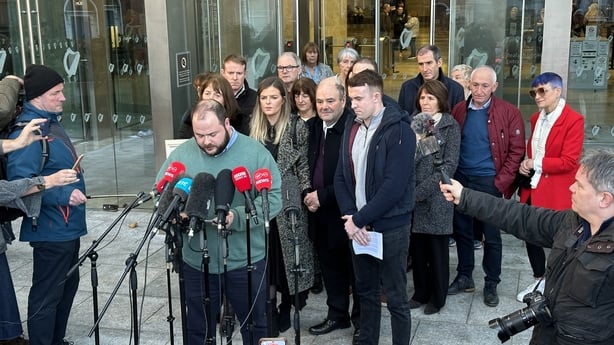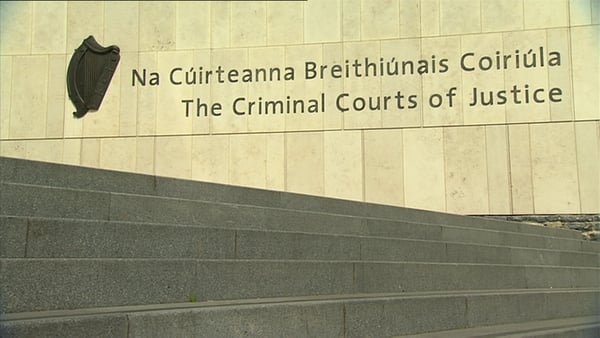Jozef Puska pleaded not guilty to murder despite the volume of evidence against him.
The sentencing hearing came at the end of a long trial.
RTÉ's Legal Affairs Correspondent Órla O’Donnell looks at why guilty pleas in murder cases are few and far between.
The trial of Jozef Puska, including pre-trial legal argument, lasted almost six weeks.
This was despite the fact the defence Puska had concocted to evade responsibility for Ashling Murphy’s murder was in the words of the trial judge "nonsense".
The trauma and heartbreak endured by her family who attended every day of the trial, were obvious to everyone in court.

The loss of their daughter, sister, partner and friend could only have been exacerbated by having to listen repeatedly to the details of Ms Murphy’s final moments and to the "pack of lies" told by Puska.
In this case, the evidence of Puska’s guilt was, the prosecution said, "overwhelming".
It may appear that there were moral or ethical reasons for him to admit his guilt.
But, legally, there’s almost no incentive for a person accused of murder to plead guilty.
The most recent report by the Law Reform Commission (LRC) on mandatory sentences in 2013, identified the life sentence for murder as the only completely mandatory sentence in Ireland.
In most other cases, a guilty plea at an early stage is a significant mitigating factor when it comes to sentencing.
In a murder case, a judge has no discretion whatsoever in the sentence he or she imposes on conviction – whether there is an immediate guilty plea or a long, hard-fought trial.
In its report, the Commission pointed out that judges in this jurisdiction cannot even recommend a specific minimum sentence that a person must serve, unlike the situation in Northern Ireland where a judge can specify how many years someone must serve before becoming eligible for parole.
It recommended that the mandatory life sentence should be retained but that there should be new legislation allowing a judge to recommend a minimum term to be served.
The Government first signalled its intention last year to introduce such legislation but it has not done so yet.
The LRC report highlighted that murder can be committed in "a variety of circumstances and can involve different levels of moral culpability".
Even though murder of any description is a very serious offence, it said some cases involve a lower degree of culpability.
Among the kind of factors that may come into play here, the LRC said, include whether the murder was committed in the heat of the moment or involved planning and premeditation, or whether an offender tried to save the victim or tortured them over a prolonged period of time before killing them.
If a judge had some discretion to consider the individual circumstances of each case, it said factors such as a guilty plea could be taken into account.
The Irish Penal Reform Trust (IPRT) also wants the law to be reformed.
IPRT Executive Director Saoirse Brady says the current system may discourage an accused person to plead guilty and she says there’s little to no evidence that mandatory sentences act as an effective deterrent to crime.

The IPRT says it believes there is a need for a wider public debate on sentencing and its purpose and is hoping to see new sentencing guidelines published by the judicial council in the near future.
Experienced senior criminal barrister Séamus Clarke agrees that allowing judges to impose a minimum sentence to be served, taking into account the circumstances of a case, could be of benefit here.
He points to the options available in the US for an accused person to plead to first or second-degree murder or as in the recent case of Molly Martens Corbett, to plead no contest in the context of a plea bargain, as issues that could be looked at in this jurisdiction.
Mr Clarke also points out that barristers are obliged to take on a case if they are free to do so and must act on their client’s instructions.
If a client gives an account of what has happened, he says a barrister can advise them on the likelihood of this account being believed.
If the client says they want to go to trial, then the barrister must defend the client as best they can and it is up to the jury to decide on the truth of the allegation.
An experienced criminal defence solicitor agrees that it would be a good idea to allow courts to consider the various different circumstances that can be involved in a murder case.
There is a difference between a cold-blooded gangland killing, this solicitor says and someone "putting poison in their spouse’s porridge after years of abuse".
The solicitor points out that the job of the defence team is to make sure that "due process" is followed.
If the State or the gardaí have made mistakes during the investigation and prosecution, it is up to the defence to point those mistakes out and to make sure that no one is wrongly convicted of a crime.
This solicitor also highlighted another reason why accused people may be reluctant to plead guilty to a murder charge.
If a person has been convicted after a contested trial there is at least some sense of "closure" for them which makes it easier to accept the prospect of spending many years of their life in prison.
The solicitor suggests they may feel that they have given it "their best shot".
Whereas if they plead guilty, they may be haunted by the thought that they could have been acquitted, no matter how slim, in reality, their chances were.
Séamus Clarke says the only possible benefit for a person accused of murder to plead guilty, is the chance that the plea may be seen by a parole board at a later date, as evidence that the person has accepted responsibility for their crime and feels some remorse.

The LRC’s 2013 report, as well as calling for a change in murder sentencing, also recommended the establishment on a statutory footing of an independent Parole Board, which has now been set up.
The 2019 Parole Act stipulates that someone sentenced to a life sentence cannot be considered for parole until they have served 12 years of their sentence.
A guilty plea or a prisoner’s remorse is not specifically provided for in the legislation.
But the board may consider factors including the nature and gravity of the original offence, the conduct of the prisoner, and any treatment, education or training he or she has undergone, the risk of the person committing an offence while on parole, submissions made by the prisoner, submissions made by the victim and any other "appropriate" matter.
Allowing a judge to have more discretion in sentencing for murder could allow a guilty plea to be taken into account by the trial judge and to be considered later by the Parole Board, giving more incentive to an accused person to avoid a trial.
It would also allow judges to more fully express their views on the circumstances of a case.
In his sentencing remarks, Judge Hunt said if he had the power to impose a minimum period to be served, he would have considered an "all of life sentence".
This whole life term can be imposed in the UK, in exceptionally unusual cases and was most recently handed down in the case of neo-natal nurse Lucy Letby for the murders of seven babies and the attempted murders of six others. But it is not available to judges in Ireland.
Judge Hunt expressed the view that the question of Puska's return to society "must be a very open one" and the judge said he hoped his remarks would be taken into account.
In the case of Jozef Puska, it is unlikely issues of remorse or responsibility would be considered in any application he may make for parole in the years to come.
The numerous lies he told about what happened on 12 January 2022, do not show any acceptance of responsibility for his crime.
The board would be likely to look at the likelihood of him committing another offence while on parole and the attitude of Ashling Murphy's family to any such application.
There is also the possibility that Puska could at some stage make an application to serve some of his sentence in his native Slovakia.
The most recent figures, from June 2021, show the average time spent in custody by a person sentenced to life, was almost 19 years.
Puska is likely to remain in prison until he is at least in his early 50s.





